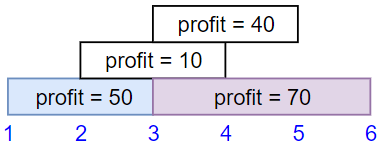1235. Maximum Profit in Job Scheduling
https://leetcode.com/problems/maximum-profit-in-job-scheduling/
We have n jobs, where every job is scheduled to be done from startTime[i] to endTime[i], obtaining a profit of profit[i].
You're given the startTime , endTime and profit arrays, you need to output the maximum profit you can take such that there are no 2 jobs in the subset with overlapping time range.
If you choose a job that ends at time X you will be able to start another job that starts at time X.
Example 1:

Input: startTime = [1,2,3,3], endTime = [3,4,5,6], profit = [50,10,40,70] Output: 120 Explanation: The subset chosen is the first and fourth job. Time range [1-3]+[3-6] , we get profit of 120 = 50 + 70.
Example 2:

Input: startTime = [1,2,3,4,6], endTime = [3,5,10,6,9], profit = [20,20,100,70,60] Output: 150 Explanation: The subset chosen is the first, fourth and fifth job. Profit obtained 150 = 20 + 70 + 60.
Example 3:

Input: startTime = [1,1,1], endTime = [2,3,4], profit = [5,6,4] Output: 6
Constraints:
1 <= startTime.length == endTime.length == profit.length <= 5 * 10^41 <= startTime[i] < endTime[i] <= 10^91 <= profit[i] <= 10^4
----
Intuition
No overlap => Next job should start after previous job has ended
Sort jobs by ending time
Need to find latest job just before current job starting time => Tree Map
Track the max profit against each end time
Initialize TreeMap 0, 0 => 0 end time => 0 profit
for each job
find entry with end time <= current start time. => TreeMap.floorEntry(current job start time)
next profit = TreeMap.floorEntry().getValue() + current profit
if next profit > max
save max
put current end time, max on map
---
Time - O(N log N)
Space - O(N)
---